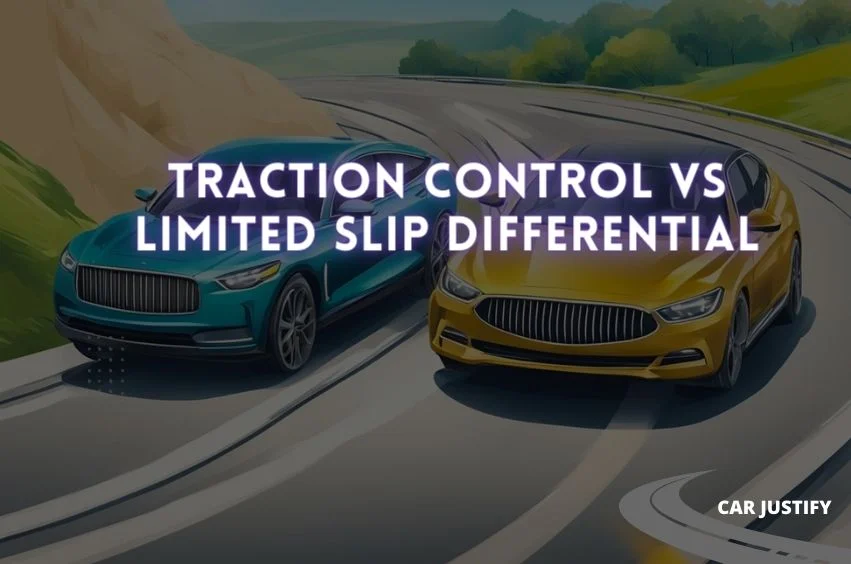Traction control vs limited slip differential are very common argument in automotive industry. These two technologies that are designed to improve a vehicle’s traction and handling.
Traction control is a system that uses sensors to detect when a wheel is slipping and automatically applies the brakes to that wheel to prevent it from spinning. Limited slip differential.
On the other hand, is a mechanical system that uses clutches to transfer torque between the wheels, allowing for better traction and improved handling. Lets dive deeper:
Traction Control: Keeping Your Car Stable

Traction Control System (TCS) is a safety feature in cars that helps keep them stable and prevents the wheels from slipping. Here’s how it works and why it’s useful:
How It Works:
- TCS senses when a wheel is spinning too fast and could lose grip.
- It slows that wheel down by using the brakes or reducing engine power.
- TCS collaborates with other safety features like ABS and ESC to keep you safe.
Why It’s Good:
- TCS boosts your car’s stability, making you less likely to skid or lose control.
- It’s a big help when the roads are slippery or wet, making driving safer and more comfortable.
How TCS Does It:
- TCS has sensors that watch how each wheel is moving.
- If one wheel is going too fast, TCS slows it down.
- It is super helpful when you’re speeding up or going around corners.
Types of TCS:
- There are a few TCS types in cars. Some use brakes to control the wheels.
- Others cut engine power to stop slipping.
- Some intelligent systems even mix both methods for the best grip in all conditions.
Limited Slip Differential (LSD): Keeping Your Wheels in Sync

A Limited Slip Differential (LSD) is a particular car part that keeps your wheels working together. Here’s what it does:
Types of LSD:
- There are different types of LSDs, like mechanical, electronic, and torque vectoring.
- Mechanical LSDs use friction to share power between the wheels.
- Electronic LSDs use sensors and computers to do the same job.
- Torque vectoring LSDs use a mix of both methods.
Why It’s Great:
- LSDs are awesome in slippery conditions because they help your wheels grip the road better.
- They ensure power is sent to the right wheel so you don’t lose control.
- LSDs also help with turning by letting the outside wheel go a bit faster than the inside, making turning smoother.
Traction Control vs. Limited Slip Differential: What’s the Difference?
Traction control and limited slip differentials are crucial features that help your car perform better and stay safe. They each have their strengths and weaknesses, depending on the driving conditions. Let’s compare them to see how they measure up.
What They Do:
- Traction control is like an electronic safety net. It stops your wheels from spinning on slippery surfaces by slowing down the engine or braking.
- Limited slip differentials are mechanical devices. They ensure power goes evenly to both wheels so they turn at the same speed.
Where They Shine:
- Traction control is great on slippery surfaces like snow, ice, and wet roads. It stops your wheels from spinning, keeping you in control.
- Limited slip differentials work better on dry roads, like pavement or gravel. They give you good traction without making the car feel sluggish.
~ More about LSD:
|| Is Limited Slip Differential Good in Snow?
How They Affect Your Car:
- Traction control can make your car slow and unresponsive because it limits engine power or uses the brakes.
- Limited slip differentials improve how your car handles and keep it steady.
Efficiency:
- Limited slip differentials are more efficient because they don’t hurt fuel efficiency.
- Traction control can reduce fuel efficiency because it slows down the engine or uses the brakes.
Safety:
- Both traction control and limited slip differentials make your car safer. They stop your wheels from spinning, whether on slippery or dry roads. That means you’re less likely to lose control of your car.
Choosing Between Traction Control and Limited Slip Differential
Choosing between traction control and limited slip differential can be a tough decision for drivers.
Both systems have their advantages and disadvantages, and the decision ultimately depends on the driver’s needs and preferences.
Here are some factors to consider when deciding between traction control and limited slip differential.
Factors to Consider
- Driving Conditions: Traction control is ideal for slippery conditions, such as wet or icy roads, as it helps prevent wheel spin. On the other hand, limited slip differential is better suited for off-road driving or performance driving, as it provides better traction on uneven surfaces and during hard cornering.
- Vehicle Type: Traction control is commonly found on newer vehicles, while limited slip differential is more common on older or performance vehicles.
- Cost: Traction control is typically less expensive than limited slip differential, as it is often included as a standard feature on newer vehicles. Limited slip differential, on the other hand, can be an expensive add-on or upgrade.
Application-Specific Considerations
- Off-Road Driving: Limited slip differential is ideal for off-road driving, as it provides better traction on uneven surfaces and during hill climbs.
- Performance Driving: Limited slip differential is also ideal for performance driving, as it provides better traction during hard cornering and acceleration.
Pros and Cons Comparison Chart
| System | Pros | Cons |
|---|---|---|
| Traction Control | – Helps prevent wheel spin on slippery surfaces – Typically less expensive | – Can be overly sensitive and limit performance – Not ideal for off-road driving |
| Limited Slip Differential | – Provides better traction on uneven surfaces – Ideal for off-road and performance driving | – Can be expensive to add on or upgrade – May not be necessary for everyday driving |

Leave a Reply